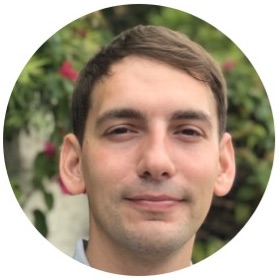This marks the 4th round of our MOMI Seeds pilot grant program, and despite the coronavirus pandemic changing the way we live and work this year, we continue to provide seed funding to UC San Diego investigators interested in human milk research.
- MOMI Seeds Pilot Grants - four Research Priority Areas
- Gut Health: effects of breastfeeding or intake of human milk components on gut health
- Analytical Technologies: applying analytical technologies to human milk research
- Social and Educational Studies: research related to social, educational and knowledge management aspects of human milk and lactation
- "Milk Moonshot": an innovative and creative idea for a project related to human milk and breastfeeding that does not fit in any of the other Research Priority Areas
In addition to this year's MOMI Seeds pilot grants, we have provided resources and analyses for several local and international research projects related to COVID-19.
2021 Awardees

| Itay Budin, PhDAssistant Professor, Department of Chemistry & Biochemistry
"Membrane Biophysics of the Human Milk Fat Globule" Lipids or fat molecules are a major nutritional and structural component of human milk. In milk, droplets of fat are enclosed by the milk fat globule membrane (MFGM), a thin sheet of lipids that serves as an interface between bioactive components during lactation. This project will analyze the structure and dynamics of this poorly understood structure using cutting-edge biophysical and mass spectrometry tools. The goal will be to understand how human-specific lipids control spatial organization of the MFGM and how these change during the post-natal period.
Dr. Budin is an Assistant Professor in the Departments of Chemistry & Biochemistry and Bioengineering. Trained as a biophysicist, his lab investigates the interplay between lipid chemistry and cell membrane function. Before joining UC San Diego, Dr. Budin received his PhD from Harvard University and carried out postdoctoral studies as a Miller Fellow at UC Berkeley. He has received early career awards from the American Society for Biochemistry and Molecular Biology and from the National Science Foundation.
|

| Hiutung Chu, PhDAssistant Professor, Department of Pathology
"Shaping the Infant Gut: The Microbiome & Human Milk Oligosaccharides" The infant gut undergoes important developmental stages that are dependent upon the colonization and maintenance of commensal gut microorganisms. Prominent members of the neonatal and adult gut microbiota are known to efficiently metabolize diverse dietary- and host-derived glycans. In the infant gut, these glycans include human milk oligosaccharides (HMOs) that are a major component of human milk. Although a number of studies have addressed the implications of glycan utilization in the gut microbiota as a whole, knowledge on the metabolic interactions among specific bacterial members and defined HMOs remain limited. This project aims to expand our understanding of the influence of human milk and HMOs on beneficial microbes that will lead to improved therapeutic and nutritional interventions for developing and malnourished infants.
Dr. Chu is an Assistant Professor in the Department of Pathology and The Center for Mucosal Immunology, Allergy, and Vaccine at UC San Diego.
Dr. Chu is a graduate of UC Berkeley where she completed her BS degree in Microbial & Environmental Biology, and received her PhD degree in Immunology from UC Davis. She completed a postdoctoral fellowship in mucosal immunology and the gut microbiome at the California Institute of Technology.
Dr. Chu leads a basic research laboratory studying how commensal bacteria modulate host immune responses during health and disease. She is a CIFAR Azrieli Global Scholar in Humans & the Microbiome
|

| Karsten Zengler, PhD
Professor, Department of Pediatrics
"Identifying In Vivo HMO Utilization by Infant Gut Microbiota using a Novel Method to Determine Microbial Niches"
Despite their importance, the specific effects of human milk oligosaccharides (HMOs) on the different members of the infants’ gut microbial community are not fully understood. This lack of understanding limits our ability to systematically exploit HMOs to promote the health and well-being of babies and possibly influence long-term health outcomes in adults. Here, we will unravel how HMOs can affect gut bacteria by using a novel approach based on next-generation sequencing and determination of the functional niche of microbes, to link the effect of each particular HMO on every microbe in the community.
Dr. Zengler is Professor in the Department of Pediatrics at UC San Diego. His work focuses on understanding microbe-microbe and microbe-host interactions, applying an integrated approach of community systems biology and molecular biology. His lab has been developing new protocols to determine the mechanistic role of the microbiome in health and disease.
|